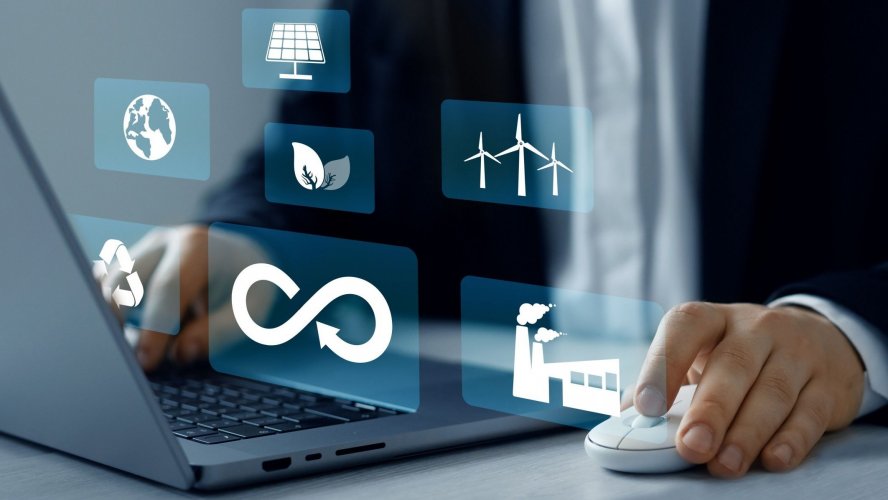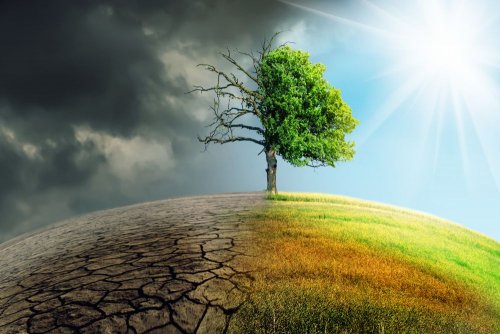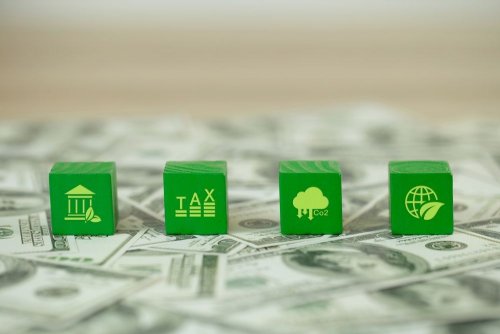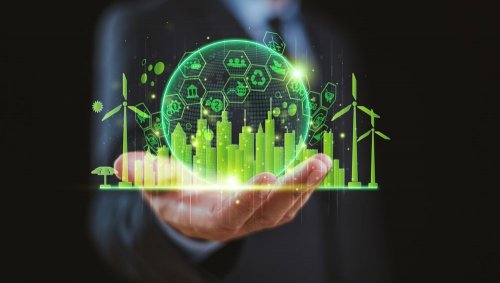After a cheerful report on the successes of the combined Ministry of Economy, Environment, and Agriculture during its first 100 days of work, its head, Oleksiy Sobolev, gave his first major interview in his new position. In it, he spoke about his ministry's immediate plans in the environmental sphere and the problems that, in his opinion, need to be solved first.
EcoPolitic decided to analyze the extent to which the balance between the economy and ecology is maintained in the plans announced by the minister.
Goal No. 1 – “Greening” the economy
According to Oleksiy Sobolev, this involves increasing the number of green finance projects and rebuilding the country in accordance with environmental standards. At present, the minister is formulating this as a strategic goal – without any details or practical examples.
The liquidated Ministry of Environmental Protection and Natural Resources of Ukraine, as well as public organizations, have been holding round tables and other events on the topic of “green” reconstruction for several years now, but progress has been very slow.
And while civil society activists are more focused on conceptual issues and general principles of “green reconstruction,” business representatives are asking government officials more specific questions about where to get the funds to implement these projects. Just recently, the first state-owned bank, UGB Ukrgasbank, issued the first loan under the state program to reduce the cost of “green” loans.
We hope that Oleksiy Sobolev will be able to stimulate the development of this area, as it would have a positive effect on both the environment and the economy.
Goal No. 2 – Coordinating with the European Commission on the mechanics of transitioning to the implementation of CBAM
The minister named a specific deadline – the next three weeks. It appears that by the end of November, Ukrainian manufacturers will finally have some clarity on this issue, which is vital for the industry.
The minister named a specific timeframe-the next three weeks. This means that by the end of November, Ukrainian producers will finally have at least some clarity regarding this vital industrial issue.
For at least two years, they have been continuously reminding about the need to postpone the implementation of the Carbon Border Adjustment Mechanism (CBAM) for Ukraine because of force majeure circumstances. Stakeholders have repeatedly appealed to the Ukrainian government to finally initiate communication with the European Commission about applying Article 30.7 of the CBAM regulation to our country, which provides for the possibility to exempt a country from CBAM during force majeure circumstances, including war.
At the end of May, Deputy Minister of Economy and Trade Representative of Ukraine Taras Kachka announced that the Ministry of Economy was preparing an official request to the European Commission to start official negotiations on postponing the application of CBAM for Ukraine.
However, as we can see, almost half a year has passed and there is still no progress.
Oleksii Sobolev also reported that Ukrainian officials are seeking to postpone the full implementation of the Carbon Border Adjustment Mechanism for Ukraine at least until 2028.
“Our current priority is business survival. Next comes providing additional investment to transition to the new system,” the minister says.
Goal No. 3 – Introduction of an emissions trading system (ETS)
According to Oleksiy Sobolev, next month the ministry will hold consultations with businesses on which model to choose for creating the ETS: to build an internal Ukrainian system, gradually implement it, and connect to the European one, or to wait a few years and immediately connect to the one operating in the EU.
It should be noted that our country committed to implementing the provisions of Directive 2003/87/EC, which regulates the functioning of the greenhouse gas emissions trading system in the European Union, more than 10 years ago when it signed the Association Agreement between Ukraine and the EU in 2014. The launch of the emissions trading system is also one of the requirements of the Ukraine Facility Plan.
Since then, talks and discussions on the creation of a Ukrainian ETS have continued. The launch date for the pilot phase has been postponed several times. It was only at the end of February that the Cabinet of Ministers of Ukraine approved a plan of measures for the creation of a national greenhouse gas emissions trading system.
The next step is to adopt a draft law on the principles of ETS functioning. The head of the Ministry of Economy predicts that the document will be prepared by the end of the year and will be adopted in the first quarter of 2026.
The introduction of a greenhouse gas emissions trading system is an important element of European integration, both from an environmental and economic point of view. Ideally, it should not only help Ukraine fulfill its obligations to the EU, but also create an effective mechanism for stimulating industrial modernization and, as a result, reducing emissions.
Both experts and civil society organizations highlight the urgent need to launch the ETS. For instance, experts from the GMK Center analytical hub believe that the domestic ETS should be aligned with European standards, while also taking into account Ukraine’s specifics.
The public organization “Ecoaction” emphasizes the importance of preventing artificial delays in launching the ETS.
"The transition period between the restoration of mandatory monitoring, reporting, and verification (MRV) of greenhouse gas emissions and the launch of the system should last no more than three years," activists believe.
Goal No. 4 – Deregulation in the forestry sector
According to the minister, the biggest problem in this area is overregulation, which leads to the underutilization of forest resources.
“Every year, Ukrainian forests grow by about 35 million cubic meters of timber, while less than 15 million cubic meters are harvested. The EU uses 70-90% of the growth, while we use less than half. The Ukrainian processing industry is ready to increase production, the only issue is the availability of additional raw materials," said Oleksiy Sobolev.
The minister said that the government is currently updating forest management documentation and preparing amendments to legislation that will "balance economic and environmental interests and make fuller use of forest resources."
So, appreciate the irony: the minister considers the problem in the forestry sector to be not systemic corruption, which was publicly announced in September by the director of the State Bureau of Investigations, Oleksiy Sukhachov, but overregulation. And the fight should not be against the corruption hierarchy built up in the State Forestry Agency, but against the legislative norms that still somehow protect Ukrainian forests.
For declaring his intentions to significantly simplify the process of obtaining permits for logging and holding numerous meetings with woodworkers on this issue, Oleksiy Sobolev has already received sharp criticism and warnings from environmental organizations. Experts from the Ukrainian Environmental Group reminded the ministry that in its annual report on Ukraine's progress, the European Commission, followed by the European Parliament, emphasized the need to maintain the environmental impact assessment procedure for logging and to introduce proper control over the issuance of logging permits.
They called on the Ministry of Economy to stop working on the abolition of environmental standards and, with the help of the environmental community, to develop a clear action plan for the preservation of Ukraine's most valuable forests.
"We hope that Minister Oleksiy Sobolev will not want to go down in history as the person who abolished all the environmental achievements in the forestry sector over the last decade and paved the way for the destruction of Ukraine's old natural forests," say environmentalists.
Goal No. 5 – Development of Alternative Energy Sources
First of all, this refers to bioethanol, biogas, and biomethane. The Ministry of Economy is searching for new markets, conducting active negotiations with Germany regarding grants to launch power generation, and advocating for Ukrainian biomethane to be sold under the same conditions as that produced in the European Union. Both industrialists and scientists speak about the promise of this direction.
However, at the same time, the ministry is ignoring a major scandal that has been ongoing for several months in another area of alternative energy-wind power. In the spring, on the Runa meadow, LLC "Turian Wind Park" began pouring the foundations for wind turbines without having a positive environmental impact assessment. At the same time, the State Inspection of Architecture and Urban Planning did not see this as a violation, since it considers the foundation not as part of the wind power plant, but as a “separate structure.”
Similarly, the State Environmental Inspection had no complaints against the developer.
The situation in Zakarpattia even led to a joint meeting of the Verkhovna Rada's European Integration and Environmental Committees. Despite the huge publicity in the public sphere, the public has not received any communication from either the liquidated Ministry of Environmental Protection and Natural Resources of Ukraine or the enlarged Ministry of Economy. Officials whose job is to protect the ecosystems of the Carpathians continue to pretend that nothing is happening.





